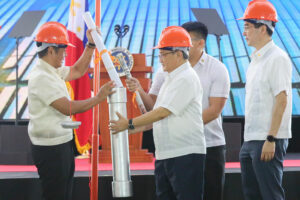TOYOTA Motor Philippines, Inc. aims to sell over 200,000 cars this year, targeting nearly 50% of the industry’s total sales, according to its president.
“In order to catch up with the fast-paced market growth, Toyota and all the manufacturers have to put great effort into the sale,” Toyota President Masando Hashimoto said on the sidelines of the 9th Philippine International Motor Show last week.
“We in Toyota will be selling more than 200,000, or close to half of the (total) market sales, by the end of this year,” he added.
In the first nine months of the year, Toyota led the market with 159,088 units sold, a 10.3% increase from 144,232 units last year, data from the Chamber of Automotive Manufacturers of the Philippines, Inc. and the Truck Manufacturers Association showed. This accounted for 46.2% of the industry’s total sales of 344,307 units.
Last year, Toyota sold 200,031 cars, representing 46.5% of the industry’s total of 429,807 units.
“Of course, there are… performance indicators, like the BSP (Bangko Sentral ng Pilipinas) cutting the rate, smaller inflation, and then increasing remittance from the overseas Filipino workers,” Mr. Hashimoto noted.
To further support the company’s growth, Mr. Hashimoto said that there is a need for clearer government support on local production and importation of cars.
“We are importing a lot of cars and, simultaneously, we are locally making cars here. As an automotive brand, we want to optimize the best balance between the import and local production,” he said.
In terms of the expansion of its dealerships, he said that Toyota’s mission is to cater to and service Toyota owners.
“Currently, we have a network of 74 dealer showrooms, and we want to make it bigger soon,” he added.
Mr. Hashimoto also said that while electric vehicles (EVs) help reduce carbon emissions, the government should consider additional options.
“Carbon dioxide reduction is our ultimate goal, and EV is still one of the options, but we believe the government should have more options rather than only EV,” he said.
“Options could be hybrid EVs, hydrogen vehicles, or biofuel vehicles, and all those are contributing to carbon dioxide reduction,” he added.
Toyota recently presented to President Ferdinand R. Marcos, Jr. its Corolla Cross H2 Concept and the Next Generation Tamaraw.
“This (Corolla Cross H2) is still a concept car. The reason we are bringing this here is to exhibit the viability and potential of hydrogen as an energy source,” Toyota Head of Marketing Services Elvin G. Luciano told BusinessWorld in an interview.
Although introducing the technology to the Philippines is distant, he said Toyota’s hydrogen technology is already used in racing and public transport.
“These have been used for buses, public transport, and other service cars in the 2024 Summer Olympics in Paris,” said Mr. Luciano.
According to Toyota, the Philippines can leverage its abundant resources in diversifying in energy sourcing and complement the decarbonization goals of various sectors.
“With Toyota’s widest array of xEV powertrain technologies, hydrogen has the potential to be one of the advanced alternative energy sources that presents the possibility of zero carbon dioxide emissions,” it added.
The company recently put up a P5.5-billion investment to produce the Next Generation Tamaraw, which is set to be launched next month.
“This investment encompasses vehicle production, parts localization, and the establishment of a new in-house vehicle conversion capability, further solidifying Toyota’s contributions to sustaining the viability of automotive and parts manufacturing industries in the country,” it said.
“Returning as a light commercial vehicle, Toyota presented its aim to revive this iconic model into the next ‘national car’ by catering to the specialized conversion needs of various Philippine micro, small, and medium enterprises and individuals,” it added.
As part of its commitment, Toyota presented its letter of intent to the President for its planned donation of five Tamaraw units to the government next year.— Justine Irish D. Tabile






